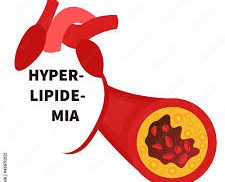Understanding and Managing Hyperlipidemia: A Comprehensive Guide


What is Hyperlipidemia and Why Should You Care?
Question: What is hyperlipidemia, and why is it a health concern?
Answer: Hyperlipidemia refers to abnormally high levels of lipids (fats) in the blood, primarily cholesterol and triglycerides. While often symptomless, it poses serious health risks if left untreated.
- Lipids are vital for body function, but too much can lead to arterial plaque buildup.
- Elevated lipid levels can increase the risk of heart attacks and strokes.
- It is commonly detected during routine blood tests as it often presents without symptoms.
- Hyperlipidemia is a major risk factor for cardiovascular disease (CVD), the leading cause of death globally.
Recognizing and managing hyperlipidemia early can significantly reduce long-term health complications. Understanding the condition helps in making informed lifestyle and treatment decisions.
Types and Causes of Hyperlipidemia
Question: What causes hyperlipidemia, and are there different types?
Answer: Hyperlipidemia can be either primary (genetic) or secondary (caused by lifestyle or other diseases).
-Primary hyperlipidemia: Inherited and includes conditions like familial hypercholesterolemia.
-Secondary hyperlipidemia: Results from lifestyle factors or underlying medical conditions.
-Common secondary causes include:
- Poor diet rich in saturated fats and cholesterol
- Obesity and lack of physical activity
- Diabetes and hypothyroidism
- Alcohol use and smoking
Each type may require a different approach to treatment, so accurate diagnosis is essential.
Symptoms and Risk Factors
Question: What are the symptoms and who is at risk of developing hyperlipidemia?
Answer: Most individuals with hyperlipidemia do not experience any symptoms until complications arise. However, certain risk factors can indicate a higher likelihood.
-Symptoms (when they occur):
- Xanthomas (fatty deposits under the skin)
- Chest pain or heart palpitations (from blocked arteries)
-Major risk factors:
- Family history of high cholesterol
- Sedentary lifestyle
- Poor dietary habits
- Smoking and excessive alcohol use Age (men over 45, women over 55)
Monitoring cholesterol levels regularly is key, especially if you fall into one or more high-risk categories.
Diagnosis and Monitoring
Question: How is hyperlipidemia diagnosed and monitored over time?
Answer: Hyperlipidemia is typically diagnosed through blood tests that measure cholesterol and triglyceride levels.
1. Lipid profile test includes:
- Total cholesterol LDL (bad cholesterol)
- HDL (good cholesterol)
- Triglycerides
2.Recommended monitoring schedule:
- Every 4-6 years for adults with no risk factors
- More frequently for those with cardiovascular risk or undergoing treatment
3. A consistent monitoring plan helps assess the effectiveness of lifestyle changes and medications.
Routine screening and early diagnosis are crucial in preventing long-term cardiovascular complications.
Lifestyle and Dietary Changes for Management
Question: What lifestyle changes can help manage or prevent hyperlipidemia?
Answer: Adopting a heart-healthy lifestyle can dramatically improve cholesterol levels and overall heart health.
-Dietary changes:
- Increase intake of fruits, vegetables, and whole grains
- Choose lean proteins and limit red meats
- Avoid trans fats and reduce saturated fat intake
-Lifestyle habits:
- Engage in regular physical activity (at least 30 minutes most days)
- Maintain a healthy weight
- Quit smoking and limit alcohol intake
- Manage stress effectively
These non-pharmacologic measures are often the first line of defense and can significantly reduce the need for medication in some cases.
Medical Treatment Options: The Role of Crestor (Rosuvastatin)
Question: What medications are available if lifestyle changes aren’t enough?
Answer: When lifestyle changes alone do not adequately control lipid levels, medications like Crestor (Rosuvastatin) can be prescribed.
-Crestor is a statin that works by blocking an enzyme in the liver responsible for cholesterol production.
-Benefits of Crestor (Rosuvastatin) include:
- Significant reduction in LDL cholesterol
- Increase in HDL cholesterol
- Lower triglyceride levels
- Proven to reduce the risk of heart attack and stroke
- It is typically taken once daily and well-tolerated by most patients.
- Regular monitoring is required to assess liver function and cholesterol levels.
Crestor is an effective tool in managing hyperlipidemia, especially for high-risk patients or those with a family history of heart disease. Managing hyperlipidemia requires a multifaceted approach that includes awareness, early detection, lifestyle changes, and, when necessary, medication. With the right strategy, individuals can effectively lower their cholesterol levels and reduce the risk of serious cardiovascular events. Taking proactive steps today can lead to a healthier, longer life.
Article Post:Editorial Team of RXShop.md
(Updated at Apr 12 / 2025)

